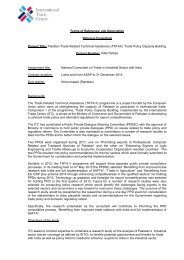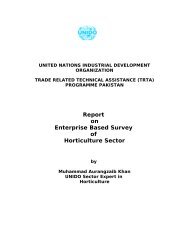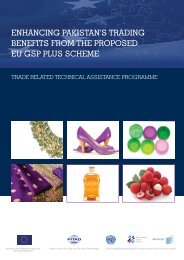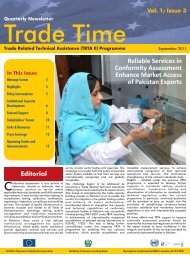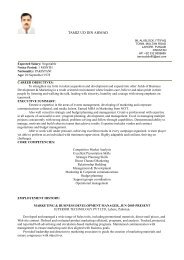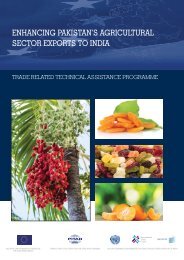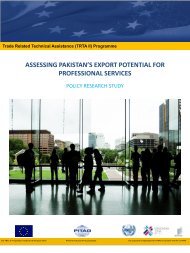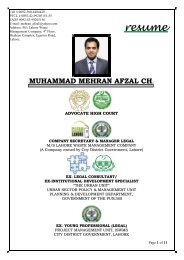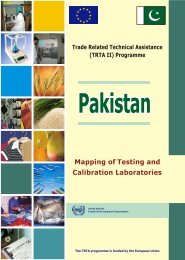Enhancing dairy sector export competitiveness - International Trade ...
Enhancing dairy sector export competitiveness - International Trade ...
Enhancing dairy sector export competitiveness - International Trade ...
Create successful ePaper yourself
Turn your PDF publications into a flip-book with our unique Google optimized e-Paper software.
ENHANCING DAIRY SECTOR EXPORT COMPETITIVENESS IN PAKISTANRecommendation(iii)Keeping in mind that loose milk in the informal <strong>sector</strong> is not regulated at all; the formal industryends up facing the brunt of government taxes. A balanced approach to provide a level playingfield should be adopted to nurture appropriate competition between the two <strong>sector</strong>s. Anincrease in the cost of production by the formal industry may lead to reliance on importedpackaged products in view of future demand. 131Reforms in Milk Pricing MechanismThe domestic <strong>dairy</strong> market is currently facing a dichotomy in which the price of loose milk is beingregulated by local authorities in the urban markets while no such regulations are applied to prices ofpackaged milk in the formal <strong>sector</strong>. In case of loose milk, the designated officials of the local authoritiescarry out a market survey and then in consultation with the relevant stakeholders fix a selling price of loosemilk in the domestic market.Measures AdoptedThe “Price Control Committees” formed under the provincial/ district governments carry out consultationswith the <strong>dairy</strong> associations to fix the retail price of milk in the local markets. 132 The price to be negotiatedwith these committees by the associations is initially agreed mutually by their members. 133Impact AssessmentThe practice of price control is highly flawed as in the first instance the members of the relevantassociation(s) come together and agree upon a mutual price and secondly; the forum of the association(s)is then used for fixation of price in coordination with the local authorities. This method gives rise tocollusive practices and deteriorates the domestic competition environment. The associations also generallyhave low negotiation powers to advocate the selling price on behalf of their members with the localauthorities.Another aspect is the potential inability of local producers to sell milk at the fixed price in view of their costof production. These enhance constraints in ensuring consistency in milk supplies to the domesticconsumers and also result into rise in the incidents of sale of adulterated/ low quality milk. Even when theprice is fixed, either due to limited capacity or lack of proper enforcement mechanism, the local authoritieshave limited authority to resort to punitive measures for those milkmen and retail shopkeepers whoincrease the prices illegally.Recommendationsi. It is proposed that the relevant government authorities should immediately withdraw theirsupport from fixing and controlling the selling price of loose milk. The practice of using privateassociations as forums to negotiate prices and the consequent ‘collusion’ created by thegovernment is against the spirit of competition and that all such agreements are prohibitedunder Section 4 of the Competition Act, 2010. 134ii. The intention behind price fixation is to keep milk and <strong>dairy</strong> products affordable for the localconsumers. The same can be achieved in a more effective and sustainable manner throughintroduction of open competition in both formal and informal <strong>sector</strong>s. The price of milk willreach equilibrium once the demand for quality milk is driven by consumers and this would also131 Pakistan Dairy Association (PDA)132Arid Agriculture University, Rawalpindi133 According to the latest price control list issued by the City District Government Lahore (CDGL), the selling price of buffalo milk isfixed at PKR 50/ litre (USD 0.5), cow milk at PKR 45/ litre (USD 0.47) and yogurt at PKR 50/ kg (USD 0.5) within the urban area.134Section 4(1) prohibits and renders void "all agreements between undertakings, decisions by associations of undertakings andconcerted practices which have as their object or effect the prevention, restriction or distortion of competition in trade in any goods orservices in the State or in any part of the State". The Act lists some specific types of behaviour which are expressly prohibited. Theseinclude “Fixing the purchase or selling price or imposing any other restrictive trading conditions with regard to the sale or distributionof any goods or the provision of any services.”82



